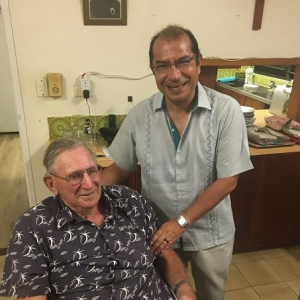Peter MALONE
Song of Names, The
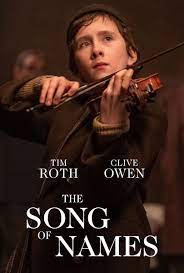
THE SONG OF NAMES
Canada, 2019, 110 minutes, Colour.
Tim Roth, Clive Owen, Catherine McCormack, Darin Howell, Jonah Hauer- King Stanley Townsend, Misha Handley, Luke Doyle, Max McMillan, Julian Wadham, Saul Rubinek.
Directed by François Girard.
Ultimately, the audience discovers the meaning of the title, Jewish musical composition incorporating the names and backgrounds and families of those killed in the concentration camps, sung at times in sad gatherings, emerging here as a way for one of the central characters to discover what happened to his parents and sisters. The composition is called The Song of Names.
The action of the film takes place in several time periods. There is 1939 when a Polish father visits London and entrusts his talented violinist young son, Dov, to the care of a British businessman who promises to bring him up in his Jewish faith and to foster his talent. This businessman also has a son, Martin. As the war progresses, especially the blitz, the two boys are initially wary of each other but find common interests and a strong friendship. The boy also plays the violin to those crowded in the underground stations, playing a rival duet with another violinist (who sadly finishes in a mental institution in Poland, Dov eventually playing the violin for him there).
There is also action in the early 1950s, Dov becoming a successful violinist, a strong bond with Martin in friendship, also with Helen, a mutual friend. There are rehearsals for a special concert as the film opens with the father fretting when Dov does not arrive for the concert and it has to be cancelled. It is revealed at this ruined the businessman who still remain devoted to Dov even on his deathbed.
The rest of the action takes place (although there are intercuttings and flashbacks all the way through). In 1986, Martin stirred again to search for Dov, tracking down contacts when he returns to visit Poland, hearing of what happened to Dov there, the search for his parents, playing his violin on the site of the Treblinka concentration camp. The journey then sends Martin to New York, eventually tracking down Dov who is living in a very Orthodox religious community (after a scene where, as a teenager, in the synagogue, he solemnly cut himself off from God and all religion). Dov begins to explain, Martin punching him. There is an explanation of what he did when he left the rehearsal, slipped on the bus, found himself in the Jewish community who are able to lead him to the Rabbi, to The Song of Names and then to Poland.
The upshot is that Martin declares Dov owes him a concert and Dov agrees, come to London, meeting Helen again, causing some anxiety, but playing the concert to applause, and finally playing his composition in memory of the concentration camp victims and his parents – and then leaving a note and disappearing.
This is a significant star vehicle for Tim Roth, a cameo, including violin playing, for Clive Owen. The film was directed by Canadian François Girard, noted for his film on pianist Glen Gould and The Red Violin.
- The title? The explanation? The ritual performance and its effect?
- A Jewish story, European anti-Semitism, World War II, concentration camps, refugees in England, the British story? The extension to the United States? From 1939 to 1986?
- The three time eras, the film moving backwards and forwards, further elaboration of characters, plot complications, and the final resolution?
- 1951, the atmosphere for the concert, Mr Simmons, anxiety, Martin and the reassurance and help, everybody waiting, tension, Dov not appearing? The effect on Mr Simmons, bankrupt, his death, yet committed to Dov? The effect on Martin? And for 35 years?
- The 1939 story, Dov’s father and the Jewish Polish background, leaving his son in London, for his tuition, skill at violin, learning Hebrew, the Jewish traditions? Mr Simmons, welcoming, the philanthropist, Dov welcomed into the family? The two boys growing up, the experience of the war? The blitz, the shelters, the young violinist rival playing the violin, Dov and the competitiveness, the applause?
- The friendship between Martin and Dov, the initial rivalry, jealousies, Dov and his skills at playing, their parents, the fights, the bond, the growing friendship? Dov and tuition, playing? His moodiness, domination, arrogance? The effect for Martin? The buildup to the concert, the rehearsals, Dov at the rehearsal, the mystery of his disappearance, Helen and her later explanation, Dov on the bus, asleep, the Jewish area, asking directions, taking him to the synagogue, friendship and support, the story of the names of the survivors, Treblinka, the book, the chant, Dov hearing of his parents? Going into the seven days of mourning, his disappearing?
- Martin, 1986, going to Newcastle, the music competition, the boy playing the violin, memories of Dov, the decision to go to search? Helen, support and scepticism? The visits to Poland, tracking down the name, the family, Dov and the young woman, taking Martin to Treblinka, the concert at Treblinka? Explaining his departure to America?
- The visit to New York, to the shops, inquiring about violins, tracking Dov down? Arriving at the apartment, Dov’s reaction, their driving, parking, Martin punching him, Dov and the explanation, and the flashbacks?
- Dov in his youth, philosophical, not-religious, renouncing God in the synagogue? His saying that God found him after four years? Moving to the community in New York, Orthodox, secluded, sense of community and subjecting individuality?
- Martin, that Dov owed him a concert? Dov’s promise? Two months? Helen sceptical, Dov and his arrival, excluding Martin from the rehearsals, the program? The night, late arrival? The audience, the performance, the applause? Dov’s reaction, downplaying his performance? Going on stage, Orthodox dress, the performance, the memories of the concert at Treblinka?
- The note, the disappearance, Dov’s regrets about Martin’s father and his bankruptcy? Apologies? But not wanting to be found? And the impact on Martin and his life’s quest to find Dov?
Woods, The
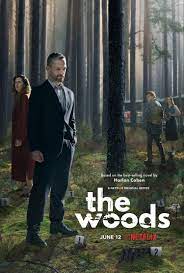
THE WOODS
Poland, 2020, 6X50 minutes, Colour.
Gzregorz Damiecki, Agnieszka Grochowska, Hubert Milkowski, Jacek Koman.
Directed by Leszek Dawid, Bartisz Konopka.
The Woods is a Polish production, transferring the story from the United States to Poland in the 1990s, the scene of a youth camp, and 2019, police investigations.
The camp scene introduces us to a group of teenage boys, friends, especially Pavel, whose mother and father are having tensions but are present at the camp, his mother in a liaison with the manager of the camp. Pavel is attracted to his daughter, Laura. Throughout the film, there are scenes of life at the camp, leading to mysterious deaths and disappearances as well as a police investigation and Pavel’s father going to the woods digging, searching for bodies.
The main action is in the 2010s, Pavel an important prosecutor, Laura lecturing at the University and wife of an older professor. Police start investigating when the body of one of the young people who disappeared is found murdered. This leads to the uncovering of all kinds of secrets, the parents of the dead man denying that he is their son. Then a body being discovered which turns out to be Pavel’s mother. Laura’s father lives in an institution and is quite involved in what has happened.
There are threats to Pavel. Pavel and Laura continue to investigate. The action goes back to the night in the woods and different explanations of what happened from what we might have expected. All the time Pavel is motivated by a search for his sister who disappeared – and, finally finding her, and a confident.
Harlan Coben fans should enjoy this series.
- The popularity of Harlan Coben novels? Thrillers? Adaptation for television series? Poland? Keeping the core of the plots and characters? In a different culture?
- The impact of the series, six episodes, the cumulative effect? Time for exploring plot, characters, investigations, resolutions?
- The Polish settings, the 1990s, the transition to the 2000s? Intercutting the time periods?
- The core mystery, the killings in the woods, the situations of the characters, the camp, the teenagers, the adult supervising, the chaperones, family connections? The disappearances, the finding of bodies? Disappearance of bodies? The investigations of the time, the police? The effect on lives and careers? The 2000s, adults, careers, unsolved mysteries? The reconnection’s, investigations, resolutions?
- The sequences at the camp, their recurring throughout the series, teenagers, boys and girls, the Polish setting, ordinary teenage life like anywhere else in Western cultures? The younger supervisors? The management of the camp, adults, the manager and Laura as his daughter? Pavel and his mother and her relationship with the head? Hit his father? The celebrations? Developing relationships, sexuality, jealousy? The focus on the woods in the title?
- Pavel, at the camp, his mother and father, relationship with them, the attraction to Laura? His friends, seeing them in action, swimming, celebrations, and jokes? The impact of the deaths? Paul following his father and his father searched in the woods? His relationship with his mother, the disappearance?
- The police, the investigations time, suspicions? Laura’s father, mother, the interrogations? The disappearance? The father and his behaviour, but his remaining with his son, going out to dig in the woods? The cleaner, her son, her being scorned? The supervisor, acting suspiciously, asault, his later arrest and charges, complicities?
- The 2000, Pavel, his job, at home, family? His cases, public office, his superiors?
- The police, the discovery of the body, the checking on identification, interrogating Pavel? The mystery of one of the teens who disappeared? New name, derelict? The issue of his scar and side, the interrogation of his parents, their lives?
- Pavel and his meeting Laura, her life, the University, her older husband, the long attraction from the past? The meetings with Pavel, helping with the investigations? Her father, the institution, the past, connecting him with the man who disappeared?
- Pavel, his obsession in searching for his sister?
- The finding of the body, the revelation that it was his mother? The effect? The dead man’s mother, revealing the truth to Pavel? The elaborate behaviour after the deaths and disappearances, their disappearing, protecting the young man, the secrecy? Over the years?
- Laura’s father, the revelations, the past, his behaviour in the past, his murder in the?
- The resolution, the flashbacks, the actual deaths, accidental, intentional, the bearing the bodies? The disappearances?
- Pavel, the attacks on him, his resignation?
- Pavel and his finding his sister, taking refuge in the convent?
Hollywood Bulldogs: the Rise and Fall of the Great British Stuntsmen
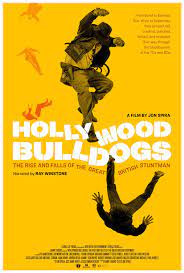
HOLLYWOOD BULLDOGS: THE RISE AND FALLS OF THE GREAT BRITISH STUNTMEN
UK, 2021, 110 minutes, Colour.
Vic Armstrong, Ray Austin, Jim Dowdle, Richard Hammett, Frank Henson, Greg Powell, Rocky Taylor, Paul Weston. Narrated by Ray Winstone.
Directed by John Spira.
Here is a treat for dedicated moviegoers. The IMDb description indicates the content and tone of this documentary.
Hollywood Bulldogs tells the rough-and-tumble story of the small community of British stunt performers who went on to dominate Hollywood in the 1970s and 80s. Growing out of the ragtag community of bouncers, gangsters and de-mobbed soldiers who were prepared to take a punch or chuck themselves down a flight of stairs for a few quid, the next generation went on to turn stunt work into a legitimate profession. They created and performed the iconic action sequences of 007, Indiana Jones, Superman, Rambo, Star Wars, Conan, the Alien films and pretty much everything since. They crashed cars, jumped from burning buildings, shot, stabbed, kicked and punched their way into cinema history. This is the first feature documentary to unite this legendary community in telling their story and as you'll see, there's life in the old dogs yet.
When we look back at the action films of the 1970s and 1980s, think James Bond, think Indiana Jones, think Star Wars… We appreciate the enormous amount of stunt work that brought those films into enjoyable action. It was the pre-computer graphics era.
The names listed above may not be familiar, although Vic Armstrong, the anchor commentator for this documentary, has had a long career including directing himself. However, each of the stuntmen has a particular personality, interesting to hear of their origins, army, stand ins… And their observations on what this has meant for their lives, some of them even sustaining severe injuries. But, they are proud of their work and enthusiastic as they talk about their life and work (except for comments and sequences showing the British director Michael Winner, generally considered obnoxious and badly demanding, risking accidents).
There are plenty of sequences from the films throughout, evoking many happy memories. And the stories about Steven Spielberg, Harrison Ford, Sean Connery, Dolph Lundgren and many others.
However, it is the look behind the action sequences that are intriguing, the meticulous detail in setting up the dstunts, the camera meticulous planning for shooting the sequences, the stand ins and the skill in editing the stars with the stand-ins in action.
The men themselves are particularly articulate – perhaps we had a presupposition that they might not be as intelligent and well-spoken as we thought. They really tell their stories very interestingly, we enjoy their company, and, now that they are older, it is very hard to imagine them as young and doing all the feats that are shown in the film.
There is a narration by Ray Winstone in his familiar gangster tones – enthusiastic but rather out of place considering the pleasing and enjoyable tones of the stuntmen themselves.
Fear of Rain
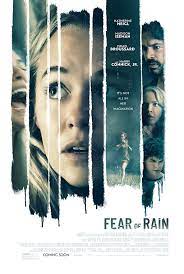
FEAR OF RAIN
US, 2021, 109 minutes, Colour.
Katherine Heigl, Harry Connick Jr, Madison Iseman, Israel Broussard.
Directed by Castille Landon.
This is a drama about schizophrenia. It also has thriller overtones.
Rain is the central character, a teenager still at school, played by Madison Iseman. She has hallucinations, words appearing on screen indicating what she hears, confusion and phobias, threatened with institutional life but agreeing to take medication, to return home with her parents, Katherine Heigl and Harry Connick Jr, and to go to school. She seems to manage well enough at home, especially with her painting. However, she is ridiculed and bullied at school by other girls but draws the attention of a friendly young student, Caleb (Israel Broussard).
One complication is that her history teacher lives next door, is filmed in a rather sinister way, tries to help Rain but Rain at times sees a young child at an attic window and accuses the teacher of abduction, and listing Caleb’s help, going online to identify faces of abducted children, entering into the house, the teacher reacting and calling the police.
Caleb and Rain become very friendly but the suggestion is that she is imagining him.
Spoiler alert: one of the shocks of the film is that Rain’s mother is dead and that she is alive in Rain’s imagination. She ultimately has a confrontation with her father who has been caring for her. On the other hand, it emerges that the teacher is guilty and there is a raid on the house.
Rain is reassured when Caleb is real – but, the film does not advocate an easy cure. Rain still imagines her mother with her, talking to her, reassuring her.
- The title? Rain as the central character? The schizophrenia and the consequences?
- The town, school, homes? The surrounding countryside? Atmosphere? Musical score?
- The issue of schizophrenia? The one personality? Voices, hallucinations, terror? The screenplay creating an atmosphere, Rain hearing voices, words on the screen? The variety of episodes? People appearing, disappearing? Images in mirrors? Mood swings?
- Rain at hospital, her parents, treatment, medication, the issue of institutions or not? Her going home? Life at home with her parents, confiding in her mother, love for her mother? Her father doing his best, redecorating the room, his cooking career, meals at home? Rain making the meal for her parents? Rain in her room, dreams, the fearful hallucinations and threats? Painting, her mother?
- The thriller aspects? The teacher in class, neighbour, pictured in a sinister way, Rain and her accusations, the abducted child, going into the house, the teacher and her complaints? Rain getting Caleb to go into the house? His running away, disappearing? The two and the Internet search, abducted children, Rain identifying the child? Ultimately going into the house, the teacher by herself and the food, Rain fighting the child, the threats from the teacher, both saved, Caleb? The teacher and the arrest?
- Rain, being mocked at school, in the dining room, the girls? Their fear of her? Caleb, friendship, the approach, at the meals, afterwards, going out together, the gradual revelation of her condition? At home, her mother catching them? Caleb going into the teacher’s home, disappearing, the return? That he was real?
- The revelation that Rain was imagining her mother, the reality of her mother’s death, going to the cemetery? The father looking out by himself? His exasperation with the teacher and her complaints?
- The resolution, friendship with Caleb, support from her father – yet the finale and her imagining her mother again?
Say Yes Again

Zai shuo yi ci wo yuan yi/SAY YES AGAIN
Taiwan, 2021, 93 minutes, Colour.
Yang-xi Hou, Wen Ling-fang.
Directed by Harry Shuell.
This is a light comedy from Taiwan, with some bittersweet overtones.
Basically, it is a Taiwanese Groundhog Day variation (with some acknowledgement to the original). The film takes some time in establishing its two central characters, a young man, reserved in some ways, infatuated with a young woman who can be rather demanding. He proposes to her – and she rejects him. And then he wakes up… And then he wakes up… And then he wakes up, forever proposing and her forever rejecting him.
Until the end!
I am Bruce Lee
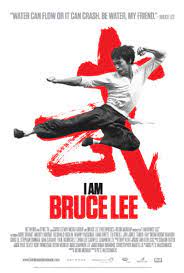
I AM BRUCE LEE
US, 2012, 90 minutes, Colour.
Directed by Pete McCormack.
This was the first in a series of portraits of celebrities, principally actors and film stars, produced by Derek Murray. Further subjects of these portraits include Steve McQueen, Paul Walker, Heath Ledger, Burt Reynolds.
As with the series, they can be viewed as personal portraits of the celebrities or they can be reviews of their careers. The films have the advantage of personal testimonies from spouses and other relations, from friends, co-stars, and experts in the field. This is the case with this film with the main witness being Bruce Lee’s widow, Linda Lee Cadwell. There is also Bruce Lee’s daughter, Shannon Lee, and the sad memory of his son Brandon Lee is untimely death.
The film offers the historical background of Bruce Lee born in San Francisco, up in his early years in Hong Kong, joining gangs, but then better educated, studying martial arts under the famous It Man (and, to saying that It man was famous because of Bruce Lee) and then moving back to the United States, to Seattle, odd jobs, study at the University, study of martial arts. Leigh was ambitious but principally in terms of education and training disciples. He absorbed a great number of martial arts styles, making them his own, getting the opportunity in the media with the 1967 television series The Green Hornet, later Longstreet, guest appearances in films and series.
There are many experts on the martial arts interviewed for this film. Which means then that it is of great interest to those who follow the martial arts – of less interest to those who do not but an opportunity to learn something of the martial arts culture, philosophy, growth and the influence of Lee. There is great admiration for Lee from those who give testimony.
From 1970 until his death in 1973, Lee made a number of feature films, developing his techniques, going to Hong Kong where he was recognised, films like Way of the Dragon produced, and then his move towards Hollywood with Enter the Dragon, his choreography, his screen presence – and then, his collapse, is untimely death, with Enter the Dragon premiered a month after his death.
A great deal is made of his tradition of Chinese philosophy, his use of aphorisms, especially the changing nature of water and its adaptability which is key to the martial arts with each individual adding their own distinction to the cumulative tradition. His intelligence is manifest in the range of television interviews that are included in this portrait. He was also something of a poet.
In the aftermath of his untimely death and the huge influence of the development of martial arts, Leigh was named as one of the most significant figures of the 20th century.
Lucid
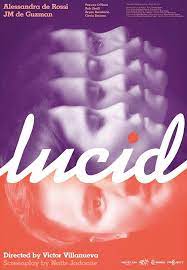
LUCID
Philippines, 2019, 86 minutes, Colour.
Alessandra de Rossi, JM de Guzman, Peewee O'Hara, Bob Jbelli.
Directed by Victor Villaneueva.
This is the story of a young woman who lives with her aunt, drab conditions, the same routines, meal with her aunt, injection, travelling by bus to work, the crowded mineral of the streets, sitting at her desk, generally ignored or asked to do extra work.
However, this is also a film about dreams, especially lucid dreams where the dreamer has control of what they are dreaming. Which means then the screenplay moves often from the young woman’s drab existence to rather glamorous on dreams, gowns and make up, restaurants, exotic locations, a huge country mansion…
She can also change with a wave of hand the contents of the dream or else its style. At first, she dreams of the young attractive man from the office. However then a strange man enters her dreams, Xavi, who also has a lucid dreams and can control. There are many scenes of their interactions, the opportunity for the young woman to grow to understand herself, want to relate to is Abby, hope that he will meet her outside the dreams, but he does not.
In the meantime, in reality, there is an enthusiastic technical worker, who comes to fix the computers, likes the young woman, jokes with her, despite her lack of response. It emerges that he has a young son. They encounter the young woman at various times, join her for meals, are sometimes rebuffed. While her work suffers because of her dreaming and daydreaming at work, she is also saddened by the sudden death of her aunt. However, this leads to further dreams, leads to her linking up with the genial man and his son, becoming part of their lives. And she gets a promotion at work.
While the screenplay is slight, it is the visualising of the dreams, the lucidity of the dreams, the control of the dreams, the interplay between dreams in real life that makes the film interesting.
And, an example of popular Filipino entertainment.
Ecos/ Echoes
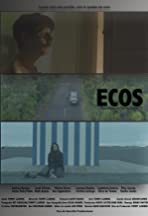
ECOS/ ECHOES
Spain, 2020, 86 minutes, Colour.
Jordi Vilches, Andrea Martos, Ken Appledornl, Ruth Armas, Nieves Bravo. Lamberto Guerra, Tommy Llorenz.
Directed by Tommy Llorenz.
Ecos is a film for a specialist audience. It is ruminative and reflective. And it might be described as pre-apocalyptic.
The film introduces a range of characters, quick portraits, eventually bringing a number of the characters together on La Palma. There is a young man at a hostel, waking, having breakfast, wandering, having come there to assess his life. He encounters a young woman sitting, interested in not interested in him, especially in his provocative manner. She listens, talks, walks away, returns. Then there is the American traveller, tourist, encountering a young woman dressed in white, mystical, but cannot relate to how and leaves her. There is a middle-aged man playing happily with his son. There is an older man, meeting a woman, his goes back to her house, seen running along the street.
At the top of the hill, there is something of a shrine, a gathering place, and some of the characters moved towards that, the tourist having conversation with the older man.
However, no one is to leave the island because the Apocalypse is about to descend, a huge storm, a tidal wave, which will sweep over the island and all the characters.
Guilty. The/ 2021
THE GUILTY 
US, 2021, 90 minutes, Colour.
Jake Gyllenhaal, Christine Vidal, voices of: Ethan Hawke, Peter Sarsgaard, Christiana Montoya, Riley Keogh, Paul Dano.
Directed by Antoine Fuqua.
The original, The Guilty, was Denmark’s official nomination for the 2018 Oscars for Best Foreign Language Film. It won many awards and was critically praised – and bloggers seem to be unanimous in their appreciation for the film. It has now been remade in the United States, accessible to audiences who are unable to or reluctant to read subtitles. This version has been directed by Antoine Fuqua, director of many action films as well as sports documentaries.
As often happens with American remakes of European films, there was general condemnation, that this version was unnecessary, that people should read subtitles, that this was exploitative of the original, that was not as good as the original. But, the issue is, that any film should be taken on its own merits without immediate comparisons with the original.
On paper, the film looks fairly straightforward, a police story, cases that they have to handle. At first, this is confirmed with a man ringing in complaining of being mugged – and it turning out that he had picked up a prostitute who mocked him. There is also a drunk who does not know where he is. In this way we are introduced to the 911 Emergency Service in Los Angeles, and the work of the man on duty, Joe.
Joe is played with extreme intensity by Jake Gill and heart of, the film focusing completely on him and his reactions, and string the phone, listening to the calls, becoming personally involved, the audience becoming more aware of his own angers and desperation, phone calls to his wife and wanting to his talk to his daughter even in the middle of the night.
In fact, the film is not quite as we expected at all. The action does not leave the Emergency Services rooms, concentrating completely on Jo, some interactions with the other members of the staff at the office, his communications by phone with other officials in order to get action going, some communication with a friend (which has serious repercussions by the end of the film). The phone call and his reactions become more and more frantic and emotional.
A number of commentators have been reminded of the film, Locke, with Tom Hardy, the action which takes place completely in a car as the central character drives. Then there is Buried, with Ryan Reynolds, the action taking place in a coffin which has been buried. Quite a challenge for a writer and director to keep audiences interested. But, The Guilty, certainly retains the interest.
The main part of the film, which is a comparatively short film, concerns a woman phoning in, gradually revealing that she has been abducted, is ringing the police but pretending to be talking to her young daughter. Joe keeps her on the phone, gets what information he can, communicates it to other officers. He also uses his wits, finding the address of the abducted woman, phoning and talking to her little daughter, gaining more information about the father and the parents’ separation, his visit to the house, his violent outburst, the little girl caring about her little brother and concerned about her mother.
Without revealing any more of the plot, it can be said that there is quite a twist in this episode, audiences asking themselves how they responded to the interrogations, the evidence, the behaviour of the mother, the behaviour of the father, the repercussions on the little girl, especially when Joe is able to advise police to go to the house.
This development makes the film more involving for the audience, interested in how Asger is handling the situation, the relative behaviours of the mother and the father.
Throughout the film, Joe has been phoning a friend who is to give testimony the next day in a court case – the friend has testified to firing a gun but the revelation is that Joe fired the gun. In a moving conversation at the end, Joe, broken down and weeping admits. There is some final voice-over as to what decisions Joe makes.
- The 911 headquarters, the tasks, the phone calls, the background of the bushfires, the television screens and the information?
- Los Angeles, the maps, the information, the roads, the police, the agencies?
- The title, the reference to the cases coming in, the drunk man, the man picking up the prostitute and her robbing him, the man with the injured knee and the ambulance, the issue of the abduction, the death of the baby? Joe himself?
- The confining the action to the interiors, the effect on the audience, the close-ups of Joe and his work at the phone, his movement around the offices, the other members of the staff present? The action going outside with the phone calls, coming in, the phone calls going out, the range of action to be taken because of the abduction case? Joe and his phoning his friend about the court case?
- The initial cases, the audience getting the feel of the office, the kind of phone calls, how they were handled, information in detail? Collaboration from other offices? Joe and his talking to his superior? Also on phone duty?
- The key case, the woman ringing, the phone call and her pretending to talk to her daughter, Joe and his asking questions for her to say yes or no, his getting the information, her abduction, her husband, the van? The attempts of the police to locate the van?
- The emotional effect on Joe, his upset, his reaction to talking to the various other officials on the phone, their being businesslike and doing their duty, his concern?
- His getting more information about the caller, addresses, phone numbers, his ringing the daughter and having a conversation with her, her shrewdness, her father getting her to memorise the phone number, her being six? The concern about her little brother? Joe phoning the police and their sending officials to the house? The news of the dead baby, the little girl and the blood? The development of the mystery?
- The information from the little girl, the turning of the expectations, Joe and his information about the husband, phoning him, the husband’s reaction, the truth gradually emerging? The mother and her psychiatric condition, killing the child? The husband taking her to the institution? His grief at the death of his son? Joe trying to help?
- The mother coming on the phone again, threatening to jump from the bridge, her reaction to her killing the child? Joe trying to talk her down, the call stopping?
- The news that the mother was safe? Joe and his ringing his friend Rick, Rick taking the blame about firing the gun, not wanting to be proven a liar in court?
- The important discussion that Joe had with the mother, telling her the truth, his killing the young man, vengeful motives, his friend taking the blame?
- Joe and his weeping, acknowledging the truth, urging his friend to tell the truth?
- The finale, the city, the media information, Joe at admitting to manslaughter?
Tribute to Herman Kooyman MSC
Tribute to Herman Kooyman MSC Peter Hendriks writes:
Papua New Guinea (where he lived for nearly 20 years, both before and after novitiate) Hagita High School
Alotau
One of the recent Hindu Temples Fergusson Island
Goodenough Island
Port Moresby
Hanuabada
Milne Bay
Stand for the Chapter candle used at every Chapter
Australia Douglas Park
Sacred Heart Monastery Kensington
Daramalan
Downlands College
Monivae College
Darwin
|
Light Box for MSC Occasions

Peter Hendriks has added: I received a number of responses adding to Herman’s long list of works that were omitted. This beautiful response came from Russ Andersen msc,
“Having lived pretty close to Hermann for several years, it was not only his untiring building ability and capacity for work-output, but also his gift of empathising with people who were down and out. How many times I witnessed his attempts to cheer people up or relieve them of some sadness by his encouraging words and attractive behaviour, and was generally successful.......he helped so often to build lives. Thanks so much Hermann”
